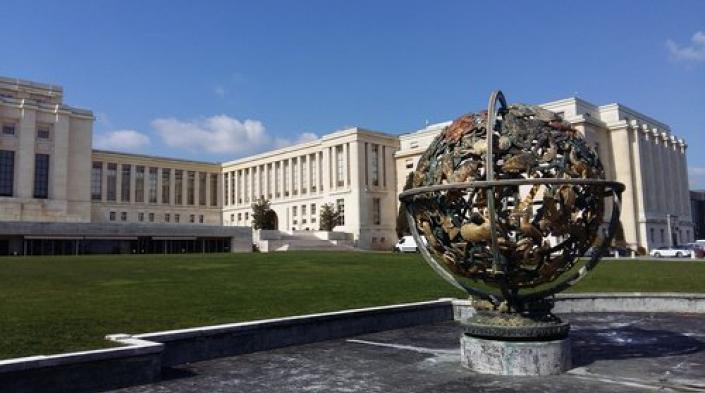 Image by konferenzadhs used under Pixabay License (https://pixabay.com/photos/un-united-nations-geneva-3362464/)
Image by konferenzadhs used under Pixabay License (https://pixabay.com/photos/un-united-nations-geneva-3362464/)
Page last updated on
H.E. António Guterres
United Nations Secretary-General
CC:
President and Bureau of the Human Rights Council
Director General of the United Nations Office at Geneva
OHCHR Human Rights Council branch
23 January 2020
Re: Ensure that the Human Rights Council is able to effectively fulfil its mandate in 2020
Excellency,
The UN Human Rights Council (the Council) is often victims’ and rights holders’ last resort to seek international attention and support for their vital work in ensuring that States uphold their international human rights obligations. The Council’s increasing work-load is an indicator of its success and relevance, in relation to both States and civil society, who continue to engage to bring issues to its attention.
In reference to the letter by the Director General of the United Nations Office at Geneva (UNOG), our organisations are deeply concerned that the Council may not be able to carry out all its mandated activities in 2020, let alone innovate to address pressing human rights challenges. The letter addressed the impossibility of delivering conference services to support this essential work of the Council as a result of the special emergency measures instituted to respond to the UN’s liquidity crisis.
We recall that the Council has already taken a number of measures over the years to address the budgetary constraints faced by UNOG. The most recent measures, adopted for 2020 at the Organisational Session on 6 December 2019, have reduced the number of meetings to well below the ceiling that the former Director General of UNOG had set for the Council. While many efforts to streamline the Council’s work have been carefully balanced, the last set of measures, which are to be tested in 2020, already significantly reduce civil society access and participation in the Council’s work (which, due to the annual sequencing of consideration of issues by the Council, will have particular impact on work on violence and discrimination against women and girls, and against persons based on sexual orientation and gender identity). Our organisations remain highly concerned that in light of the special emergency measures and ongoing budget constraints, further measures may be imposed to restrict civil society participation at the Council.
Even with the measures already adopted by the Council, and their negative impact on civil society access, the Council will still require to meet occasionally at lunch-time, in particular during the 43 rd session of the Council due, among other reasons, to the high-level segment meetings. A complete elimination of lunchtime meetings would disrupt the agenda of the
Council, and prevent it from carrying out all of its mandated activities. It is also likely to further disproportionately affect civil society participation, at a time when civil society around the world and in the UN is already at risk. In addition, the draft programme of work of the 43rd session has not yet been finalized by the Council Secretariat, due to the uncertainty around the provision of conference services for all meetings. This has had a negative impact on the ability of civil society organisations to plan engagement of their representatives at the 43rd session, and in particular for organisations without any presence in Geneva or whose relevant representatives are not based in Geneva.
We also reiterate our deep concerns regarding the larger issues of the chronic gross and disproportionate underfunding of the UN human rights pillar which receives only 3.7% of the UN budget, in comparison with the other two pillars. Any argument of consistent UN-wide budget cuts must be placed in the context of balancing UN wide budget allocation.
We recall that the Council is the only intergovernmental body whose mandate is exclusively to promote and protect human rights across the world. Limiting its ability to carry out its mandate would be inconsistent with General Assembly Resolution 60/251 and would have negative consequences for the work of the UN in the field of human rights.
Accordingly, our organisations urge you, along with Member States, to ensure the allocation of sufficient resources for the UN’s principal human rights body to be able to function effectively, so that it can continue to promote and protect human rights across the globe. While we understand that, over the longer term, Member States need to ensure timely payment of contributions and adequate budgetary allocations, we also understand that the immediate concerns could be addressed through an exemption from the special emergency measures.
We also call on you, Mr. Secretary-General, to firmly and unequivocally support the full and effective participation of non-governmental organisations (NGOs) in the Council’s work, as mandated by GA Resolution 60/251.
Sincerely,
1. International Service for Human Rights (ISHR)
2. International Commission of Jurists (ICJ)
3. DefendDefenders (East and Horn of Africa Human Rights Defenders Project)
4. International Movement Against All Forms of Discrimination and Racism (IMADR)
5. Baha’i International Community
6. Center for Legal and Social Studies (CELS)
7. Egyptian Initiative for Personal Rights (EIPR)
8. CIVICUS: World Alliance for Citizen Participation
9. Asian Legal Resource Centre
10. Cairo Institute for Human Rights Studies (CIHRS)
11. Asian Forum for Human Rights and Development (FORUM-ASIA)
12. The African Centre for Democracy and Human Rights Studies (ACDHRS)
13. Human Rights Watch (HRW)
14. Conectas Direitos Humanos
15. Humanists International
16. The Southern African Human Rights Defenders Network (SAHRDN)
17. Commonwealth Human Rights Initiative
18. FIDH (International Federation for Human Rights)
19. Child Rights Connect
20. Save the Children
21. ARTICLE 19
22. IFEX
23. Human Rights House Foundation (HRHF)
24. Sexual Rights Initiative
25. Association for Progressive Communications (APC)
26. ILGA World


